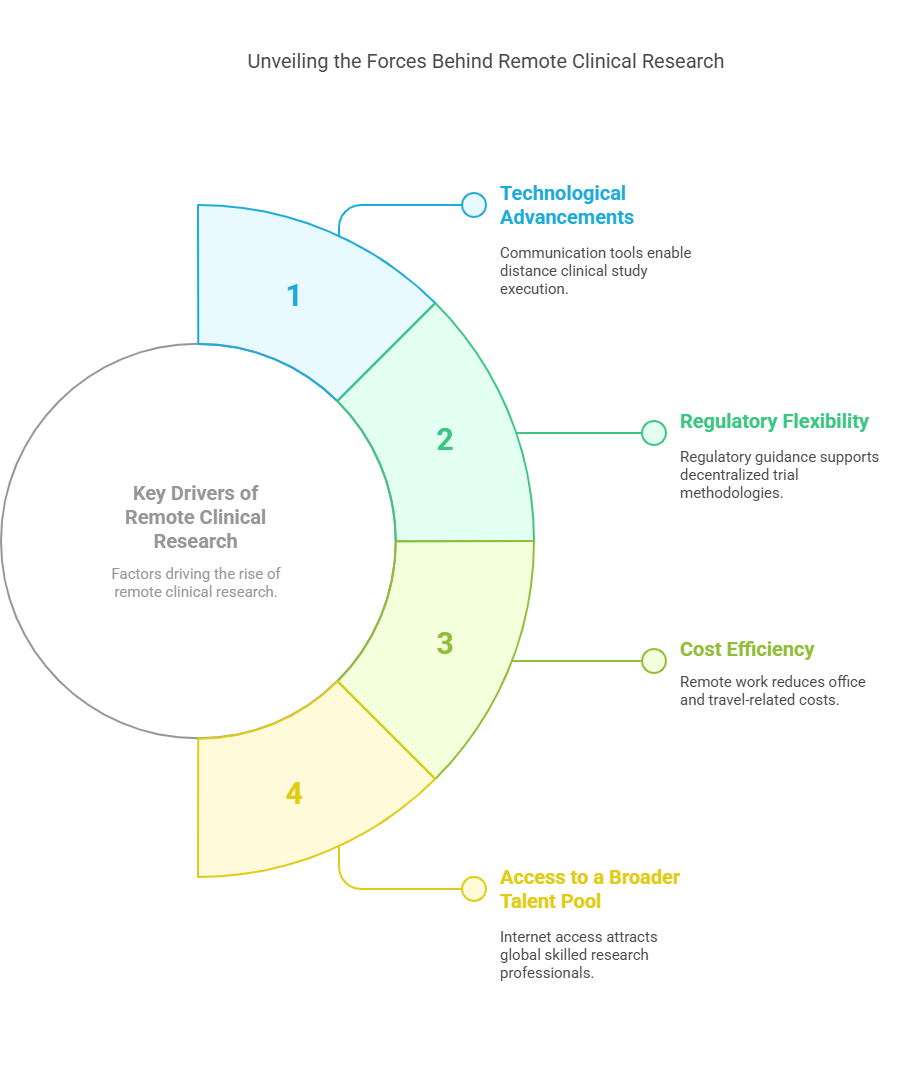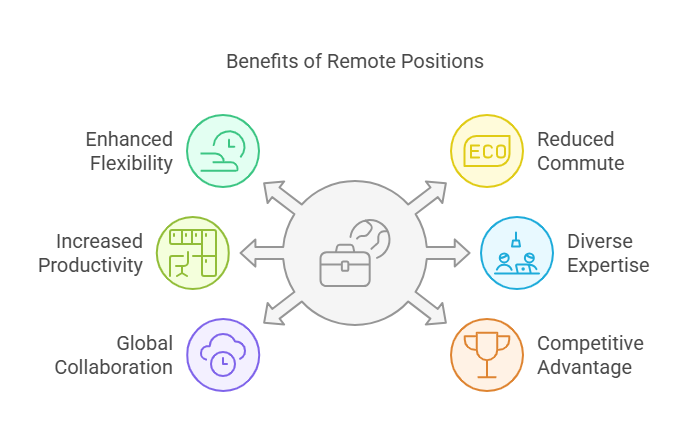Clinical Research Remote Positions
The clinical research environment has experienced a substantial transformation by adopting remote positions during recent years. The evolution stems from technological progress and workplace changes together with the requirement for flexible work arrangements. This blog examines remote clinical research positions through their essential features along with their advantages and obstacles and projected developments.
A New Era in Clinical Research
The COVID-19 pandemic led to rapid changes in remote work adoption across different sectors including clinical research. The transition to remote work has allowed clinical trials to operate continuously with no major interruptions thus enabling essential research to advance safely and reliably. Remote clinical research positions now exist which enables professionals to perform their work from any global location.
Key Drivers of Remote Clinical Research
Several factors have contributed to the rise of remote positions in clinical research:
Technological Advancements: The advancement of communication tools together with electronic data capture (EDC) systems and remote monitoring technologies enables researchers to perform clinical studies at a distance.
Regulatory Flexibility: The FDA along with other regulatory bodies has given direction on decentralized clinical trials which has opened the door for remote research methods.
Cost Efficiency: The reduction of overhead costs from physical office spaces and travel expenses is achieved through remote work.
Access to a Broader Talent Pool: Organizations can use the internet to attract skilled professionals from all over the world.
Benefits of Remote Positions in Clinical Research
Enhanced Flexibility and Work-Life Balance
Remote positions enable clinical research professionals to perform their work from home or any preferred location. The ability to work from home provides clinical research professionals with better work-life balance which leads to reduced stress and higher job satisfaction.
Flexibility: Professionals can create their own schedules, which leads to a better work-life balance.
Reduced Commute: The daily commute elimination results in time and money savings which leads to better health outcomes.
Increased Productivity: Many professionals find that they are more productive when working in a comfortable and familiar environment.
Access to Global Talent
Organizations can now select the most qualified candidates regardless of their location through remote positions. The ability to hire the best talent from around the world breaks down geographic barriers. The inclusion of diverse perspectives through remote hiring enables organizations to find innovative solutions to clinical research challenges.
Diverse Expertise: Access to a wider pool of candidates with varied expertise and backgrounds.
Global Collaboration: Enhanced collaboration across different time zones, leading to round-the-clock progress on research projects.
Competitive Advantage: Organizations can stay ahead of the competition by leveraging the skills and knowledge of a global workforce.
Challenges and Solutions in Remote Clinical Research
Overcoming Communication Barriers
Effective communication is crucial in remote clinical research. Without face-to-face interactions, it can be challenging to ensure clear and consistent communication among team members.
Regular Check-ins: Implement regular virtual meetings to keep everyone aligned and address any issues promptly.
Collaboration Tools: Utilize advanced collaboration tools, such as Slack, Microsoft Teams, and Zoom, to facilitate seamless communication.
Clear Documentation: Maintain thorough and accessible documentation to ensure everyone has the information they need.
Ensuring Data Security and Compliance
Remote work can pose challenges to data security and regulatory compliance. It is essential to implement robust measures to protect sensitive information and adhere to regulatory standards.
Secure Access: Use secure, encrypted connections for accessing and sharing data.
Training and Awareness: Provide regular training on data security best practices and regulatory requirements.
Compliance Monitoring: Implement continuous monitoring to ensure compliance with industry regulations.
Future Prospects of Remote Clinical Research Positions
Continued Growth and Innovation
The trend towards remote clinical research positions is expected to continue, driven by ongoing technological advancements and the need for flexible work arrangements. Organizations will increasingly adopt decentralized clinical trial models, leveraging remote monitoring and data collection technologies.
Embracing Hybrid Models
While remote work offers numerous benefits, some aspects of clinical research may still require in-person interactions. Hybrid models, combining remote and on-site work, will likely become more prevalent, offering the best of both worlds.
Investing in Remote Work Infrastructure
Organizations will need to invest in robust remote work infrastructure to support their teams effectively. This includes advanced communication tools, secure data management systems, and comprehensive training programs.
Conclusion
In conclusion, the evolution of remote clinical research has reshaped the industry, offering significant benefits such as increased flexibility, access to global talent, and cost efficiency. However, challenges like communication barriers and data security must be addressed to ensure smooth operations. As the demand for flexible work arrangements grows, remote and hybrid models are set to become the standard in clinical research. For professionals looking to further their careers in this field, obtaining certification through organizations like CCRPS can provide valuable expertise and recognition in the growing remote clinical research landscape.
For more insights and updates on clinical research trends, check out the following references:
FDA Guidance on Decentralized Clinical Trials
By staying informed and adapting to the evolving landscape, clinical research professionals can thrive in remote positions and contribute to groundbreaking advancements in medical science.
Explore Courses for Clinical Research Career
Courses Available:







